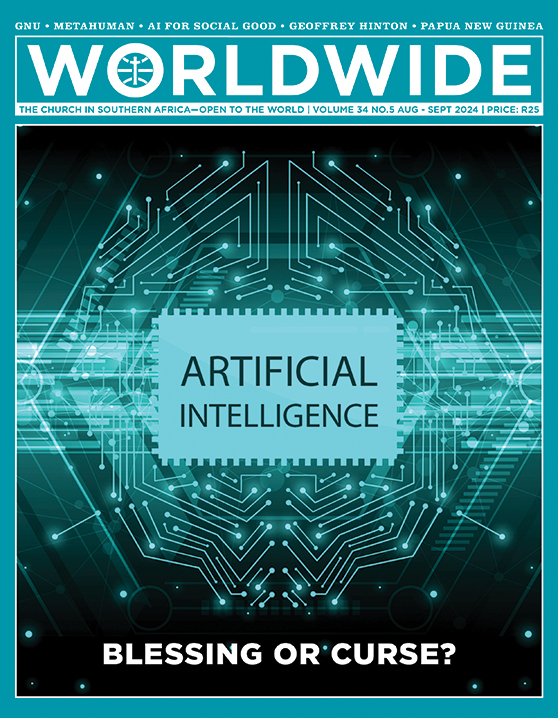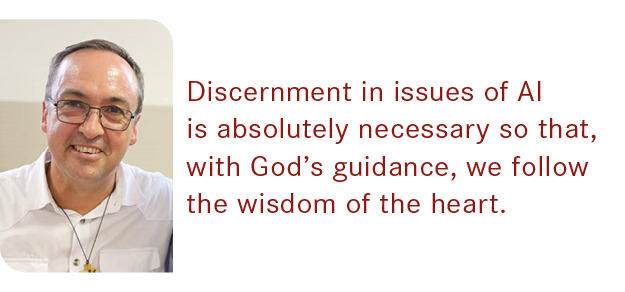
ARTIFICIAL INTELLIGENCE: BLESSING OR CURSE?
The image, according to Chat GPT, features the phrase “ARTIFICIAL INTELLIGENCE” at its centre, overlaid on a stylized depiction of a microchip and circuitry. This design symbolizes the integration of advanced AI technologies within modern electronic systems, emphasizing the critical role of AI in driving technological innovation and enhancing computational capabilities across various industries.
EDITORIAL

ARTIFICIAL INTELLIGENCE AND THE WISDOM OF THE HEART
BY Rafael Armada | EDITOR
ARTIFICIAL INTELLIGENCE (AI) is already a firm part of our lives: a system that gathers massive amounts of information, connects this information at an incredibly high speed and can respond to innumerable demands and perform many of our daily tasks.
AI is an extremely powerful tool which can improve our lives regarding technology, in areas such as health or in combating crime and corruption, and by providing unrestricted access to information to the global community. It can ease many of our tasks, including tedious or demanding duties and jobs. However, AI needs to remain at the service of every human being — without discrimination—respecting the dignity of all.
Pope Francis, recently addressing the G7 leaders in Italy, acknowledged the antagonistic feelings which AI may produce in us. We are thrilled about the possibilities which it offers us but, at the same time, we experience fear of the possible consequences of its inappropriate use, especially if the freedom and the responsibilities of every individual are significantly diminished. “AI is a technology that could easily escape the control of its human creator”, Pope Francis said. In its advanced forms “it will not be fully under the supervision of either users or programmers who defined their original purposes, since AI programs will be able to communicate directly with each other, improving their performance” in rather an autonomous manner. A tool created by human beings may end up shaping our lives.
Here comes the concern of many experts when they speak about the issue of “singularity”— a term borrowed from the world of physics — which refers to the moment beyond which we are not able to predict what will happen next. If AI reaches that point, which appears not too remote, we may be uncertain of the direction in which technology may take us.
There is, therefore, an urgent need to bring ethical values to the debate on AI. Institutions and experts all over the world, including the so-called godfather of AI, Geoffrey Hinton, are adamantly demanding a set of regulations and a framework which can preserve human control over AI, avoiding the possibility of its devastating use by unscrupulous minds.
The Rome Call, an initiative created by the Pontifical Academy of Life in 2020, and signed by many high-tech corporations and institutions, is an important milestone, bringing the values of the Universal Declaration of Human Rights to the forefront. They express their conviction that the human person must be at the centre of every decision regarding technological advancements.
Before us lies an opportunity to exercise our responsibilities and to look after the wellbeing of our future generations. The Summit of the Future, organised by the United Nations and scheduled for 22-23 September 2024, also intends to address and respond to these emerging challenges. Discernment in issues of AI is absolutely necessary so that, with God’s guidance, we follow the wisdom of the heart.
South Africa has engaged with the ethical aspects of AI through its National Artificial Intelligence Plan. This Plan expresses the opportunities created by AI for economic growth and improving humanitarian challenges of the continent; but it also points out the concern that AI may create social and digital divides. In this month of August, a month dedicated in South Africa to women, we pray and advocate that AI may become an instrument which enhances their respect and wellbeing.
| Dates To Remember |
|
August 9 – National Women’s Day in South Africa 9 – International Day of the World’s Indigenous People 12 – International Youth Day 18 – The Assumption of the Virgin Mary 19 – World Humanitarian Day 21 – International Day of Remembrance and Tribute to the Victims of Terrorism 22 – International Day Commemorating the Victims of Acts of Violence Based on Religion or Belief 23 – International Day for the Remembrance of the Slave Trade and Its Abolition 31 – International Day for People of African Descent September 5 – International Day of Charity 7 – International Day of Police Cooperation 7 – International Day of Clean Air for Blue Skies 8 – International Literacy Day 9 – International Day to Protect Education from Attack 12 – International Day for South-South Cooperation 15 – International Day of Democracy 16 – International Day of Science, Technology and Innovation for the South 17 – World Patient Safety Day 18 – International Equal Pay Day 20 – World Cleanup Day 21 – International Day of Peace 23 – International Day of Sign Languages 24 – South Africa’s Heritage Day 26 – International Day for the Total Elimination of Nuclear Weapons 28 – International Day for Universal Access to Information 29 – World Day of Migrants and Refugees 29 – International Day of Awareness of Food Loss and Waste |
